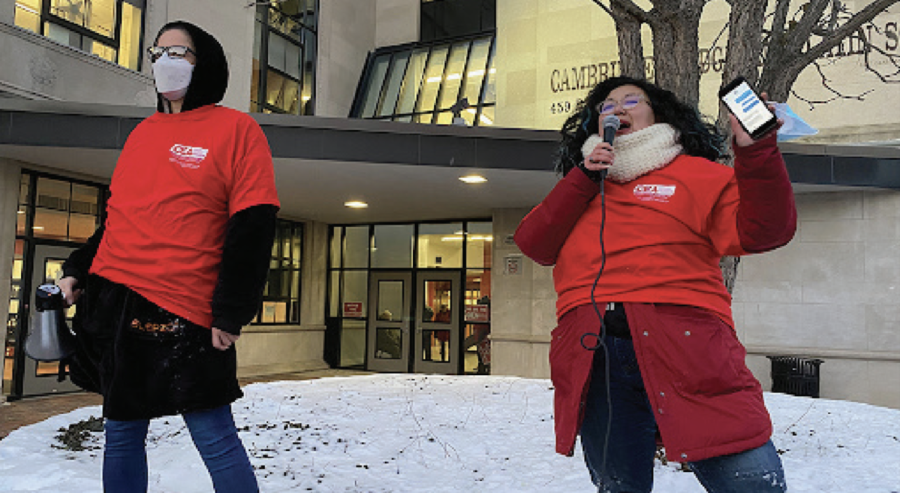Negotiations Between District and Teachers’ Union Stall
May 17, 2022
In what Cambridge Education Association (CEA) head Dan Monahan describes as “the most difficult negotiations […] in 25 years,” the teachers’ union and the district have spent seven months struggling to agree on what to include in a new contract for Cambridge educators.
Both the CEA and Cambridge Public Schools (CPS) say they share a commitment to educating their students and maintaining a healthy school environment. It’s thus puzzling that negotiations would be so difficult.
The union’s proposed agreement, a summarised version of which is available here, puts antiracism first and foremost. It further requests that teachers be given a chance to participate in decision making, more reasonable workloads, and more equitable pay. The union has also been pushing for a contract that will last three years, so as to guarantee the teachers some security. Dan Monahan, head of the CEA, cited “paid family medical leave, which all workers in the private sector have by law,” as well as “commitment to addressing […] workload issues” as items of importance to union members.
CPS has criticised these proposals as too broad. It’s pushed for a one year contract, saying that this would give all parties time to come up with improved proposals. The district also hopes to wait for the development of the superintendent’s strategic plan—something Ms. Newton, CRLS science teacher and teacher representative to the union, described as “a very long process.”
The district has put forth a stripped down contract that largely maintains the status quo. It includes minimal antiracism measures, keeps teachers out of the decision making process, and features pay increases that fail to keep up with inflation.
The CEA sees this contract as maintaining the status quo, which in their view has been harmful to teachers and students alike. Particularly over the course of the pandemic, the decouplement between teachers and the decision making process led to several sudden changes that took teachers by surprise and harmed the classroom environment. The many schedule changes that occurred last year are a prime example of this. Additionally, students and teachers alike have been pushing for increased implementation of antiracism measures by the district, and the union sees the CPS’ proposal as failing to address this need. Finally, the current proposed contract fails to recognize “high cost of living in the Boston area,” and doesn’t “value educators as professionals,” Ms. Newton said.
The pandemic pushed Cambridge educators to work harder than ever under highly stressful conditions. Teachers were tasked with enforcing an ever-fluid set of policies imposed by the district, leading to confusion around everything from grading to attendance to classroom hours and expectations. Teachers and students alike were subjected to ever-changing COVID protocols voted on by the district. The union feels that the district’s treatment of teachers was disrespectful and harmful to the classroom environment, and the CEA’s proposed contract tries to address that.
Over the course of the negotiations, each party has accused the other of stalling or employing obstructionist tactics. The district has criticised the union for refusing to return to the bargaining table as it reworks its proposal. The union has criticised the district for its use of what Mr. Monahan described as an “obstructionist law firm.” The CEA further called out the district’s refusal to compromise, as well as its preference to postpone negotiations while waiting for the superintendent’s strategic plan to be developed.
According to Ms. Newton, the union is trying to compromise. “We are presenting a 2 year proposal this week. We hope the district will be willing to discuss a substantive 2 year agreement,” she said.
The district has called for a joint appointment of an independent mediator to help both parties work through their issues. The union has yet to agree to this, saying that it wants to finish its contract proposal first.
For this article, 53 students were asked over email what they heard teachers saying about the union and the district. Of the 21 students who remembered hearing their teachers talk about the union, an overwhelming 95% mainly heard positive things. 32 students hadn’t heard anything. Conversely, of the 30 students reported having heard their teachers’ opinions on the district, 86% mostly remembered hearing negative things. 23 didn’t remember hearing anything.
“Our members do not feel respected by the district. They have been working beyond capacity for over two years during this pandemic and deserve compensation, recognition and commitments to address what is important to them. It seems the school committee is not willing to put the resources forward,” says Mr. Monahan.
This piece also appears in our April 2022 print edition









